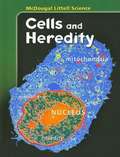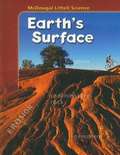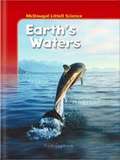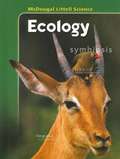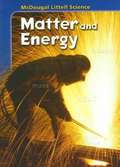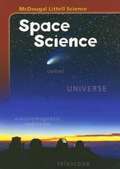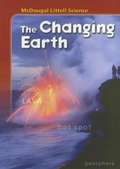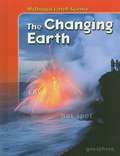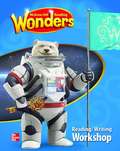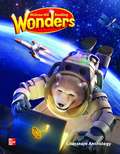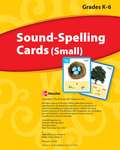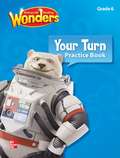- Table View
- List View
McDougal Littell Science: Cells and Heredity
by Rita Ann Calvo Kenneth Cutler James TrefilScientists are curious. Since ancient times, they have been asking and answering questions about the world around them. Scientists are also very suspicious of the answers they get. They carefully collect evidence and test their answers many times before accepting an idea as correct.
McDougal Littell Science: Earth’s Surface
by Mcdougal LittellScientists are curious. Since ancient times, they have been asking and answering questions about the world around them. Scientists are also very suspicious of the answers they get.
McDougal Littell Science: Earth’s Waters,Water Cycle,Habitat
by The Editors at the Houghton Mifflin CompanyEarth Science Textbook covering Earth's Waters including The Water Planet, Freshwater Resources, Ocean Systems, and Ocean Environments.
McDougal Littell Science: Ecology
by Rita Ann Calvo Kenneth Cutler James TrefilScientists are curious. Since ancient times, they have been asking and answering questions about the world around them. Scientists are also very suspicious of the answers they get. They carefully collect evidence and test their answers many times before accepting an idea as correct. In this book you will see how scientific knowledge keeps growing and changing as scientists ask new questions and rethink what was known before.
McDougal Littell Science: Grade 6 (Oklahoma Edition)
by Mcdougal LittellScientists are curious. Since ancient times, they have been asking and answering questions about the world around them. Scientists are also very suspicious of the answers they get. They carefully collect evidence and test their answers many times before accepting an idea as correct.In this book you will see how scientific knowledge keeps growing and changing as scientists ask new questions and rethink what was known before.
McDougal Littell Science: Grade Six (South Carolina Edition)
by Mcdougal LittellMcDougal Littell Science pulls together units from the different categories of science to give you a broad picture of how scientists study nature. For example, life scientists, earth scientists, and physical scientists might all study water, but from different points of view.
McDougal Littell Science: Space Science
by Mcdougal LittellScientists are curious. Since ancient times, they have been asking and answering questions about the world around them. Scientists are also very suspicious of the answers they get.
McDougal Littell Science: The Changing Earth
by Mcdougal LittellScientists are curious. Since ancient times, they have been asking and answering questions about the world around them. Scientists are also very suspicious of the answers they get.
McDougal Littell Science: The Changing Earth (Grades 6-8)
by Mcdougal LittellIn this book you will see how scientific knowledge keeps growing and changing as scientists ask new questions and rethink what was known before. The text and pictures in this book will help you learn key concepts and important facts about earth science. A variety of activities will help you investigate these concepts.
McDougal Littell World Cultures and Geography: Eastern Hemisphere
by Marci Smith Deal Donna Ogle Charles White Sarah Bednarz Ines MiyaresThe author provides an account of world cultures and their geographical significance across borders and explains the importance of linking history with geography.
McDougal Littell World History
by Douglas Carnine Carlos Cortés Kenneth CurtisNIMAC-sourced textbook
McGraw-Hill English (Level #8)
by James Elizabeth Marvin William Hoffman Klein Sulzby TealeEnglish Textbook.
McGraw-Hill Language Arts (Grade #6)
by Jan E. Hasbrouck Donna Lubcker Sharon O'Neal William H. Teale Josefina V Tinajero Karen D. WoodMcGraw-Hill Mathematics: Grade 6
by Macmillan Mcgraw-HillThis textbook will prepare students for future mathematics courses and also consolidate the core ideas of what they have learned previously from various mathematics textbooks. The contents of this course are many of the fundamental ideas and procedures necessary to be successful in subsequent mathematics courses and many careers.
McGraw-Hill Reading 6th Grade
by Angela Shelf Medearis Jan E. Hasbrouck James Flood Diane Lapp Josefina Villamil Tinajero Karen D. Wood James V. Hoffman Scott Paris Steven StahlThis book has unit lessons on: Pathways, A Common Thread, With Flying Colors, Seek and Discover, Barnstorms, and All Things Considered.
McGraw-Hill Reading Wonders [Grade 6]
by Jana Echevarria Douglas Fisher Donald R. Bear Janice A. Dole Scott G. Paris Timothy Shanahan Josefina V. Tinajero Diane August Jay Mctighe David Francis Vicki Gibson Jan Hasbrouck Margaret KilgoNIMAC-sourced textbook
McGraw-Hill Reading Wonders [Grade 6]
by Jana Echevarria Douglas Fisher Donald R. Bear Janice A. Dole Scott G. Paris Timothy Shanahan Josefina V. Tinajero Diane August Jay Mctighe David Francis Vicki Gibson Jan Hasbrouck Margaret KilgoNIMAC-sourced textbook
McGraw-Hill Reading Wonders, Grades K-2, Sound/Spelling Cards
by Mcgraw-Hill EducationThese laminated cards in two sizes support instruction in medial short-vowel sounds, final consonant sounds, and vowel variants. Small cards feature lenticular support with a moving picture to assist students in proper sound spelling connections.
McGraw-Hill Reading Wonders: Your Turn Practice Book (Grade #6)
by Macmillan Mcgraw-HillReading Wonders is the first and only reading program designed specifically for the Common Core State Standards for Reading/Language Arts.
McGraw-Hill Science
by Richard H. Moyer Joanne Vasquez Jay Hackett National Geographic Society Pamela Stryker H. Prentice Baptiste Lucy H. DanielThis book is organized into four units-Life, Physical, Earth, and Human Body sciences.
McGraw-Hill Science 6th Grade, Unit B: Organization of Living Things
by Lucy Daniel Joanne Vasquez Jay Hackett Richard Moyer Pamela Stryker H. Prentice BaptisteThis book deals with lessons on Cells and Inheriting Traits.
McGraw-Hill Science: Observing The Sky 6th Grade
by Lucy Daniel Joanne Vasquez Richard Moyer Pamela Stryker Jay Hackett H. Prentice BaptisteThe branch of science that deals with "what's up there" is astronomy. Astronomy is the study of the universe. The universe is everything that exists--Earth and all the things in space. The contents of space include the planets, stars, and galaxies.
